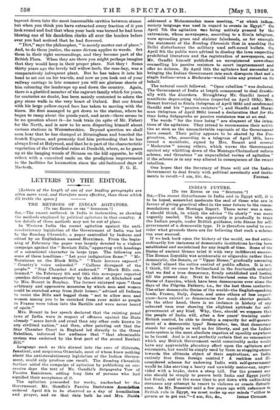LETTERS TO THE EDITOR.
[Letters of the length of one of our leading paragraphs are often more read, and therefore more effective, than those which fill treble the spaced THE METHODS OF INDIAN AGITATORS.
[To THE EDITOR or THE " SPECTATOR.") Sre,—The recent outbreak in India is instructive, as showing the methods employed by political agitators in that country. A few details of those methods may not be out of place.
In Western India the recent agitation against the anti- revolutionary legislation of the Government of India was led by the Bombay Chronicle, a paper controlled by Indians and edited by an Englishman named Horniman. From the begin. ning of February the paper was largely devoted to a violent campaign against the " Rowlett Bills,".appearing with headings of -a sensational character in large type. The following are some of these headlines " Let your indignation flame." " Mr. Horniman on the Black Bills." "Their horrors exposed." " Country's voice unheeded." "Callous disregard of the people." "Star Chamber Act endorsed." "Black Bills con- demned." On February 6th and 14th this newspaper reported speeches delivered respectively by the-editor at Allahabad and by Mrs. Besant in Bombay. The former enlarged upon "these arbitrary and oppressive measures by which men and women could be snatched away from their homes," advised all Indians to resist the Bills and begged them " not to allow men and women among you to be snatched from your midst as people in France were taken into the Bastille and were never heard of again."
Mrs. Besant in her speech declared that the existing penal laws of India were in respect of °fleeces against the State already "more harsh and cruel than any other code known in any civilized nation," and then, after pointing out that the Star Chamber Court in England led directly to the Great Rebellion, informed her audience that " that abominable system was endorsed by the first part of the second Rowlett Bill."
Language such as this dinned into the ears of illiterate, fanatical, and suspicions Orientals, most of whom knew nothing about the anti-revolutionary legislation of the Indian Govern- ment, could only produce one result. The Bombay Chronicle further aided the campaign of agitation by publishing on suc- cessive days the text of Mr. Gandhi's Sateograha Vow of Passive Resistance, adding long lists of persons who hurl signified their acceptance of it.
The agitation proceeded for weeks, unchecked by the Government. Mr. Gandhi's Passive Resistance Association ordered April 6th to be observed as a day of humiliatioa and prayer, and on that date both he and Mrs. Nelda addressed a Mohammedan mass meeting, "at which inflam- matory language was used in regard to events in Egypt." On April 7th the agitation was being actively pressed by the extremists, whose newspapers, according to a Simla telegram, were spreading gross and sinister falsehoods, as for example the statement of the Bombay Chronicle that in quashing the Delhi disturbances the military used soft-nosed bullets. On April 9th the public were advised to disobey the laws respecting prohibited literature and the registration of newspapers, and Mr. Gandhi himself published an unregistered news-sheet counselling his passive resisters to court imprisonment and offer no defence. By April llth the agitators had saceeeded in bringing the Indian Government into such disrepute that not' a single Indian—even a Moderate—would raise any protest en its behalf.
The natural result followed. "Open rebellion " was declared. The Government of India at length commenced to deal drastic. ally with the disorders. Straightway Mr. Gandhi issued a manifesto deprecating violence (reported on April 13th); Mrs. Besant hurried to Simla (telegram of April 16th) and condemned Gandhi and his "passive resisters"; and Gandhi and Horni- man (telegram of April 20th) issued a declaration that for the time being Saryagrahe or passive resistance was at an end. The words " for the time being " are eloquent of the inten- tions of the agitators. They intend to recommence their activi- ties as soon as the uncomfortable reprisals of the Government have ceased. Their policy appears to be shared by the Pro- gressives, who, according to a telegram of April 18th, have issued a manifesto, signed by Mrs. Beeant and several " Moderates " among others, which warns the Government against any whittling down of the Montagu-Chelmsford reform scheme, and threatens "an unparalleled vortex of agitation" if the scheme is in any way altered in consequence of the recent rebellion.
One hopes that the Secretary of State will aid the Indian Government to deal firmly with political mendacity and incite-


































 Previous page
Previous page